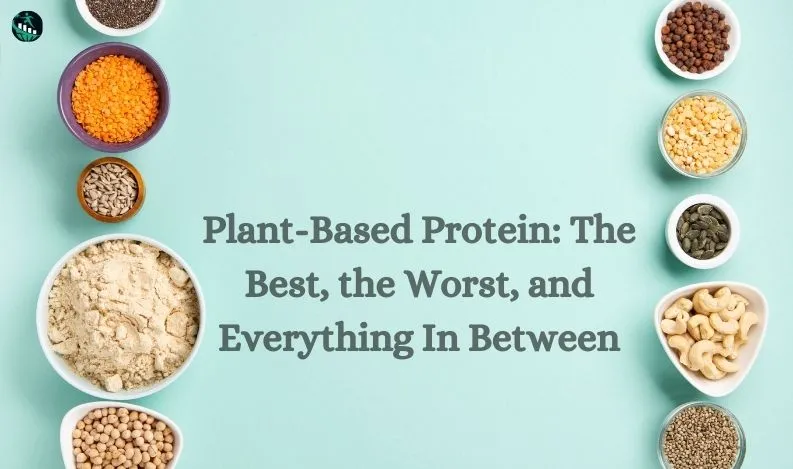
Plant-Based Protein: The Best, the Worst, and Everything In Between
In the evolving narrative of nutrition, plant-based proteins play a pivotal role, reflecting a shift towards more sustainable and health-conscious eating habits. With the surging popularity of vegetarian and vegan diets, plant-based proteins have come under the spotlight, challenging traditional notions of dietary protein sources. This comprehensive guide delves deep into the realm of plant-based proteins, exploring their myriad forms, nutritional profiles, health impacts, environmental benefits, and offering insights into making informed choices in your dietary journey.
Unveiling Plant-Based Proteins
The Powerhouses of Nutrition
Legumes: Lentils, chickpeas, and black beans are not only protein-rich but also a great source of fiber, iron, and folate, supporting heart health and aiding digestion.
Nuts and Seeds: Almonds, walnuts, chia seeds, and hemp seeds offer a combination of protein, healthy fats, fiber, and essential micronutrients, contributing to overall well-being.
Whole Grains: Quinoa and oats stand out as nutrient-dense options, providing a good source of protein along with fiber, B vitamins, and various minerals.
Soy Products: Tofu, tempeh, and edamame are versatile soy-based proteins that are complete proteins, containing all nine essential amino acids.
The Not-so-Great Options
While many plant-based proteins offer a wealth of nutritional benefits, some options might not be as beneficial due to high processing levels or added ingredients:
Processed Meat Substitutes: Some vegan meats are heavily processed and can contain added salts, sugars, and fats.
Refined Grain Products: Products made from refined grains, such as certain breads and pastas, may offer protein but lack the fiber and nutrients found in their whole grain counterparts.
The Spectrum of Health Benefits
Adopting a diet rich in plant-based proteins can have profound health benefits:
Reduced Risk of Chronic Diseases: Diets high in plant proteins are associated with lower risks of developing diseases such as heart disease, type 2 diabetes, and certain cancers.
Weight Management: Plant-based proteins often come with lower calorie counts and higher fiber content, helping in weight management and satiety.
Nutritional Bounty: They provide essential nutrients including fiber, vitamins, minerals, and antioxidants, supporting overall health.
Environmental Impact: A Greener Choice
The choice of plant-based proteins over animal-derived sources can significantly impact the planet:
Lower Greenhouse Gas Emissions: Plant-based protein production generally emits fewer greenhouse gases compared to livestock farming.
Conservation of Resources: It requires less water, land, and energy, contributing to sustainability.
Biodiversity Preservation: Reduces the strain on wildlife habitats and promotes biodiversity.
Navigating the Plant-Based Protein World: FAQs
Q: Can plant-based proteins completely replace animal proteins?
A: Absolutely. A well-planned plant-based diet can provide all necessary nutrients, including protein. Diversifying your sources ensures a complete amino acid profile.
Q: How can I ensure adequate protein intake on a plant-based diet?
A: Incorporate a variety of protein sources such as legumes, nuts, seeds, and whole grains throughout the day. For athletes or those with higher protein needs, consider adding a plant-based protein powder.
Q: Are there plant-based proteins that should be consumed in moderation?
A: Yes, particularly processed plant-based meats due to their potential high sodium and saturated fat content. Opting for whole, minimally processed foods is key.
Takeaway: A Path to Nutritional Harmony
The journey into the world of plant-based proteins is not merely about substituting or eliminating animal products; it's about embracing a broader, more inclusive approach to nutrition that benefits both personal health and the planet. By understanding the vast landscape of plant-based proteins—from the nutritional champions to those best enjoyed sparingly—you can craft a diet that is not only rich in all essential nutrients but also aligned with ethical and environmental values.
Embracing Diversity for Optimal Health
The diversity of plant-based proteins ensures that with a little creativity and planning, you can enjoy a diet that is as nutritious as it is varied and flavorful. Experiment with different sources, explore new recipes, and discover the unique tastes and textures that plant-based proteins offer. Whether you're fully committed to a vegan lifestyle or simply looking to reduce your meat intake, the world of plant-based proteins offers a rich tapestry of choices to nourish your body and delight your palate.
As we continue to evolve in our understanding of nutrition and sustainability, plant-based proteins stand out as a key ingredient in the recipe for a healthier future. By making informed choices about the proteins we consume, we take steps towards not only improving our health but also protecting the precious resources of our planet. So, embark on this journey with an open mind and an adventurous spirit, and let the world of plant-based proteins enrich your life in ways you never imagined.
Also Read:-



Recent Comments: